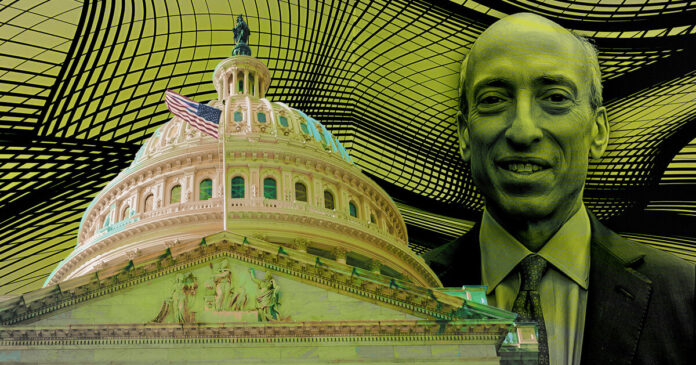In a bold move, U.S. Congressman Warren Davidson, with support from House Majority Whip Tom Emmer, has advocated for the firing of SEC Chair Gary Gensler in 2024, attributing his stance to alleged corruption and abuses of power.
This development comes amid escalating tensions between the SEC and the digital asset sector throughout 2023.
Restructuring the SEC
Davidson, voicing significant concerns over Gensler’s enforcement-first regulatory approach, believes this has strained the SEC’s relationship with the digital asset industry. To address these issues, Davidson introduced the SEC Stabilization Act earlier this year.
The Act, aiming to restructure the SEC and remove Gensler, cites a “long series of abuses” under Gensler’s leadership. It proposes adding a sixth commissioner and an Executive Director to oversee day-to-day operations, with all rulemaking, enforcement, and investigation powers remaining with the commissioners.
The proposed restructuring aims to prevent a single political party from holding more than three commissioner seats, thereby safeguarding U.S. capital markets from potential political agendas.
Davidson emphasized the need for reform, stating:
“U.S. capital markets must be protected from a tyrannical Chairman, including the current one. It’s time for real reform and to fire Gary Gensler as Chair of the SEC.”
Emmer supported Davidson’s sentiments, highlighting the necessity for clear and consistent oversight in the interest of American investors and the industry rather than political maneuvering.
In addition to Davidson’s legislative efforts, tweets from various supporters echo the sentiment for Gensler’s removal and the Act’s passage.
One tweet highlighted the goal of ending the accredited investor rule, asserting it protects the interests of a privileged class. Another tweet accused Gensler’s SEC of favoring Wall Street over Main Street, endorsing Davidson’s bill as a means to hold the SEC accountable.
These developments and the proposed SEC Stabilization Act mark a critical juncture in the ongoing dialogue about regulatory approaches and accountability within the U.S. financial regulatory framework.
Credit: Source link






















 Bitcoin
Bitcoin  Ethereum
Ethereum  XRP
XRP  Tether
Tether  Solana
Solana  USDC
USDC  Dogecoin
Dogecoin  Cardano
Cardano  Lido Staked Ether
Lido Staked Ether  TRON
TRON  Chainlink
Chainlink  Avalanche
Avalanche  Wrapped Bitcoin
Wrapped Bitcoin  Wrapped stETH
Wrapped stETH  Stellar
Stellar  Toncoin
Toncoin  Hedera
Hedera  Sui
Sui  Shiba Inu
Shiba Inu  WETH
WETH  Litecoin
Litecoin  Polkadot
Polkadot  LEO Token
LEO Token  Hyperliquid
Hyperliquid  Bitcoin Cash
Bitcoin Cash  Bitget Token
Bitget Token  Uniswap
Uniswap  USDS
USDS  Wrapped eETH
Wrapped eETH  Ethena USDe
Ethena USDe  Official Trump
Official Trump  Pepe
Pepe  NEAR Protocol
NEAR Protocol  Ondo
Ondo  MANTRA
MANTRA  Aave
Aave  Monero
Monero  Aptos
Aptos  Internet Computer
Internet Computer  WhiteBIT Coin
WhiteBIT Coin  Ethereum Classic
Ethereum Classic  Bittensor
Bittensor  Mantle
Mantle  Cronos
Cronos  Dai
Dai  POL (ex-MATIC)
POL (ex-MATIC)  OKB
OKB 
